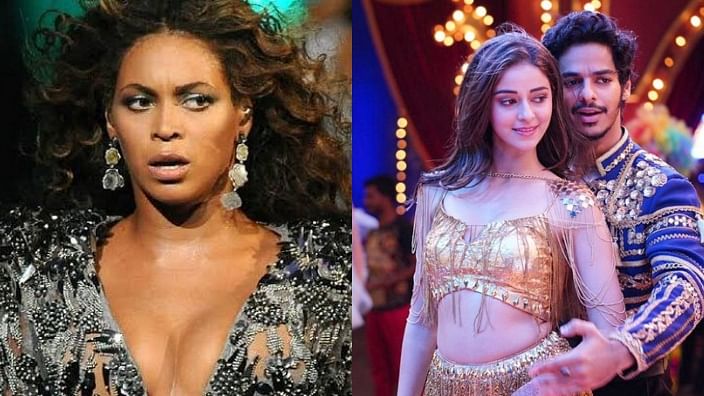Ishaan Khatter and Ananya Panday’s latest dance number Beyonce Sharma Jayegi song controversy left netizens disappointed. The song triggered outrage as many believed the song was regressive and racist. Debates around the prevalence of colourism in India have also surfaced.
“Beyonce Sharma Jayegi”- A song that received almost three lakh dislikes within just three days of its release. The song is from the forthcoming film Khaali Peeli, featuring Ananya Panday and Ishan Khatter. As soon as the song was released, social media users were intrigued by the name of the song and overwhelmed the song with the dislike button.
Social media was flooded with the reactions of netizens as the song was found to be an attack on dark-skinned people and promotes colourism. The song is also upbraided for its regressive idea, while on the flip side, many netizens also portrayed their disapproval of Bollywood regarding blatant picturisation of women.

Here’s the lyrics of the song that ignited the outrage on social media making the song distasteful for the audience: “Chamkeeli lachkeeli tu jo kamar yeh hilayegi, tujhe dekh ke goriya Beyonce sharma jayegi.” Beyonce being let down by the song triggered a whole new debate in the Indian film industry, Bollywood.
What is Beyonce Sharma jayegi Song Controversy?
Taking a dig at the song, the netizens not only criticised the lyrics of the song but also took the actors, composers, and lyricists into wraps. With most people having a problem with the lyrics of the song, many found that the song is a complete disrespect to the American pop star, Beyonce. A large number of people took to twitter and apologised Beyonce on behalf of the song produced by Bollywood.
Many tweets came questioning the creativity of the song, while some tweeted memes to show how Beyonce would react to the song.
One of the major reasons behind the disappointment of the audience with Bollywood was that the song came just a few weeks after Beyonce came out with a song called the “Brown Skin Girl” that campaigns for cultural pride and female empowerment.
One of the twitter users even wrote, “Beyoncé: includes a dark-skinned South Asian in brown skin girl mv to show how beautiful dark skin is. And, Bollywood makes a song with blatant colourism saying that Beyoncé, a black woman, will be put to shame and be shy after seeing a fair-skinned woman.”
Let’s take nepotism aside:
Keeping the whole nepotism argument aside, let’s focus on the fact that Bollywood is racist. It’s not the first time that Bollywood has used such remarks. It’s since for the years now when we frequently hear the word ‘Kaala/gora or goriye’ in Indian films. Many talented Bollywood actors have come up with their stories of racial discrimination from time to time.
This casual racism by Bollywood has led to the blatant portrayal of colourism and setting up some particular beauty standards. The Indian film industry has often mocked black people and even made fun of the people with darker skin tones. Nevertheless, the song is not only criticised for its lyrics but is also regarded as not a great song because of its meaninglessness.
Beyonce Sharma Jayegi: Bollywood’s Hypocrisy on Another Level
The song Beyonce Sharma Jayegi came out to the public in such a climate when the #BlackLivesMatter movement gained immense support from all across the globe. Bollywood actors also came out in support of the movement and raised their voices against institutionalised racism.
It was ironic that Bollywood stars took to their Twitter and Instagram to say that “All colours are Beautiful” while endorsing skin-lightening products in their home country. Today colourism and racism are deeply rooted in our society, with white skin always seen as superior – all credit goes to Bollywood.
While we do hear of some strong-motivated songs and movies in Bollywood exposing the talent of our country to take over the world. A song like Beyonce Sharma Jayegi, that even in 2020 is shocking, therefore we need to reconsider the movies and songs we promote as citizens. It’s high time we neglect these meaningless item songs and start seeing movies about social realism.

